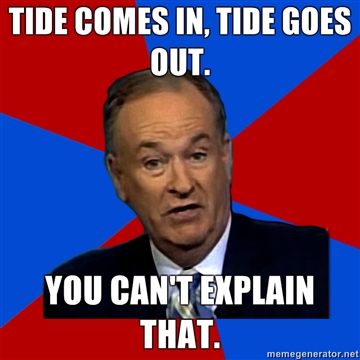
Bad Arguments: Personal Incredulity
Welcome to another edition of Bad Arguments. Today’s topic is Personal Incredulity, which is a subset of the the logical fallacy, Argumentum ad Ignorantiam (Argument from Ignorance). This is usually phrased as, “Well how else can you explain (insert topic that isn’t understood by the person)?”
The problem here is that just because someone can’t think of a better explanation, doesn’t mean that a better explanation doesn’t exist, and it doesn’t mean their explanation wins by default. Any claim stands or falls on it’s own merits, based on the evidence.
When addressing theistic claims, it is often called the “god did it” argument. As in, “I don’t understand how the world came to be, so god did it”. Just because YOU don’t have an explanation, doesn’t mean someone else doesn’t either. Plus, like I said, even if no one knows the answer yet, your position doesn’t win by default.
People who use this argument use lack of explanation as proof that they are right. The argument also makes the incorrect assumption that all that can ever be known is known now. For instance, some agnostics hold the position that we will never be able to know whether or not a god exists. We may not have the tools now, but we might in the future.
While an Argument from Ignorance focuses on knowledge (I don’t KNOW how else something could have happened), Personal Incredulity focuses on imagination (I can’t IMAGINE how else something could have happened). They both rely on a kind of false dichotomy, where they eliminate or ignore multiple possibilities. Personal Incredulity says that something (like evolution) is too astounding to be true and since they can’t imagine something that astounding, then it must be false. Or that they can’t imagine something (like a god existing) to be false, so it must be true. It limits the outcome to only two opposing possibilities.
The main reason I can’t stand this argument, is while Pascal’s Wager is the most annoying argument to me, Personal Incredulity is by far the most common. So many people have given up thinking. Why bother looking for a better explanation for something, when you can just say, “god did it”? Plus, this isn’t evidence. It’s a LACK of evidence. It’s a way of giving up because you can’t think of any other explanation.
If someone had evidence for something, like god, they’d present it. Instead, the people in this example, just assume that since they haven’t thought of any better explanation than “god did it”, that it must be true and not need evidence. They don’t explain HOW god did “it”, just that he did. It’s an appeal to magic, in a way. A deus ex machina of sorts. Where when you’re faced with a question that is too complex for you, you have a magical answer that solves all of the problems. Except that it’s ASSUMED to be true. It’s not PROVEN to be true. Saying “god did it”, doesn’t actually prove that god did anything, or even exists. It’s an escape ploy. “This question is too hard and I don’t want to work to figure it out, so… MAGIC!”
Theists, it’s ok to say that you don’t know something. It’s ok to say you don’t understand something. It’s ok to say that something is too amazing to believe… like god. Don’t jump to the conclusion that since YOU can’t think of a better explanation for something, that you must be right.


